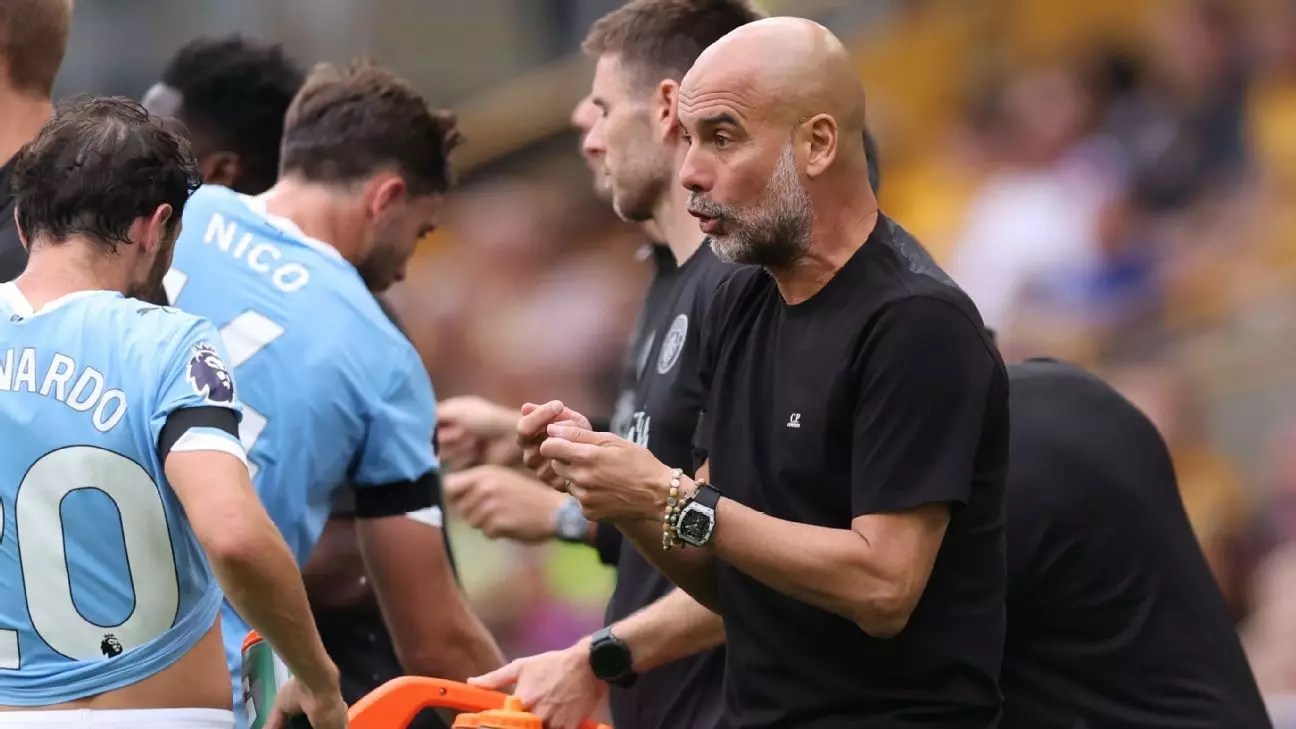Manchester City’s commanding 4-0 victory at Wolverhampton Wanderers opened their Premier League campaign with a flourish, signaling their ongoing dominance in English football. Erling Haaland’s brace and notable contributions from new signings Tijjani Reijnders and Rayan Cherki showcased City’s attacking prowess and tactical versatility. Such a dominant victory over a respectable opponent revealed that City remains a team to beat and further cemented their reputation for clinical finishing and strategic execution. However, beneath this shiny surface, the club’s underlying issues threaten to mar their pursuit of sustained excellence.
Guardiola’s assessment of the squad’s size exposes a less glamorous reality: complacency and internal discord could threaten their cohesion. The manager’s candid critique about the squad being “not healthy” reflects deeper concerns about squad management, player morale, and the delicate balance between breadth and quality. While a deep squad is vital for competing on multiple fronts, having an excess can breed resentment, reduce playing time for deserving players, and disrupt team harmony—especially when the locker room dynamics become strained. Guardiola seems acutely aware that a happy, motivated squad outperforms a bloated one driven by superficial depth.
Struggles in Squad Management and Player Logistics
The club’s current challenge revolves around offloading players to restore a healthy competitive environment. McAtee’s departure for Nottingham Forest for £30 million epitomizes City’s ongoing effort to trim their squad, but the task is far from complete. The fog of player uncertainty and the ambiguity surrounding key figures like goalkeeper Ederson underscore the complexity of squad restructuring. Rumors of a potential move to Galatasaray involving Ederson, although dismissed by Guardiola, exemplify the turbulence behind the scenes. The Brazilian goalkeeper, Guardiola’s undisputed number one, also faces questions related to his future—complicating both team planning and morale.
Guardiola’s diplomatic stance—that the final decision rests with the club—does little to assure supporters or players who may feel unsettled by transfers or speculation. His insistence on club authority highlights that player movements are more about systemic planning than individual desires, yet the instability can have residual effects on team chemistry. The notion that some players might leave if not happy signals a fragile environment that could deteriorate if not managed carefully. The next two weeks are thus crucial in solidifying the squad’s composition and maintaining a positive atmosphere.
Assessing the Playing Style and Future Prospects
From a tactical perspective, City’s opening performance demonstrated their signature transition play, leveraging Haaland’s pace and precision finishing. Reijnders’ impressive debut, contributing to two goals, emphasizes the importance of smart recruitment—signings that add immediate impact and long-term value. Guardiola’s focus on quick attacking transitions and exploiting opponents’ turnovers remains evident, yet he admits areas for improvement, especially in maintaining consistency across the entire match. The first-half dominance contrasted with a less cohesive second half suggests that City’s experimentation and adaptation ongoing.
While Guardiola’s satisfaction with the result is understandable, it is tempered by the acknowledgment that this team has yet to reach its peak. The season is long, and the squad’s internal issues—player discontent, redundancy, and off-field speculation—could hinder their ability to sustain momentum. If City is to claim their seventh league title in nine seasons once again, they will need to do more than just secure wins; they must ensure squad harmony, manage player ambitions, and fine-tune their tactical execution.
Manchester City’s stellar start offers hope and confidence, yet it also exposes the cracks beneath their seemingly invincible facade. Guardiola’s critique about squad depth underscores a broader challenge: how to balance ambition with internal stability. The coming weeks will test their ability to manage personnel sustainably while maintaining their high standards on the pitch. As City aims for yet another league triumph, their greatest obstacle may well be their own internal dynamics—an intricate dance of talent, ego, and management that requires precision, patience, and unyielding focus. The road ahead promises excitement, chaos, and opportunities for City to reinforce their legacy or confront new vulnerabilities in their quest for continued greatness.


Leave a Reply